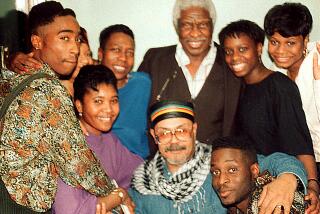Shcharansky : HERO OF OUR TIME by Martin Gilbert (Elisabeth Sifton/Viking: $24.95; 467 pp.)
When Anatoly Shcharansky crossed the snow-covered Glienicke Bridge from Potsdam to West Berlin last February, he found a small media army waiting to record every moment of his short walk to freedom. The fact that the release of a “refusenik,” one of the many Soviet Jews who had been refused permission to emigrate, should attract so much attention demonstrated his remarkable accomplishment. After nine years in prisons and a labor camp, Shcharansky personified both the aspirations of other refuseniks and of the dwindling band of activists demanding that the Soviet state live up to the human rights provisions of the 1975 Helsinki accords.
British historian Martin Gilbert had completed “Shcharansky” three weeks before the East-West prisoner exchange whose most prominent beneficiary was the book’s subject. His account reads more like a testimonial than a conventional biography, which is hardly accidental. Gilbert, who had already written about the refusenik movement in his earlier book “The Jews of Hope,” was intent on adding to the pressure on Moscow for Shcharansky’s release. Much of the book is filled with Shcharansky’s letters from prison and appeals by his wife Avital, who emigrated to Israel the day after their marriage in 1974, and others who lobbied so effectively on his behalf.
Now that Shcharansky has been able to tell his story and is working on a book of his own, the shortcomings of a testimonial are readily apparent. His letters from prison frequently had to carefully skirt the most interesting topics to make it past the censor. Today’s reader is likely to expect more probing of the inner man than appears in these pages. But Gilbert can hardly be faulted; it is just that the success of the lobbying effort he was a part of has meant that events outpaced his writing.
Nonetheless, this remains a valuable account of a man and a movement. It offers chilling examples of the Soviet system’s deep-rooted anti-Semitism. In a 1974 trial, another Jewish activist, Dr. Mikhail Shtern, was accused by one witness of poisoning children and spying for Israel; a year later, Radio Minsk explained that Judaism was “contrary to our Communist morality, the aims of our society, and the progress of modern life.” So much for the notion that the rabid anti-Semitism of the Stalinist era has truly disappeared. And Gilbert convincingly debunks the myth, which Kremlin spokesmen are only too happy to promote, that the Soviet system is immune to Western pressure. The KGB tried to shatter Shcharansky’s resolve by claiming that the West had lost interest in his case, proof enough how worried they are by every bit of attention such cases attract.
Even in this inevitably incomplete portrait, Shcharansky emerges as not just admirable for his courage but also as a man of genuine warmth. Whether he is calling the KGB to let them know that one of his tails is drunk or pointing out with self-deprecating satisfaction that a friend is even shorter than he is, he demonstrates a capacity for humor that speaks well of his basic humanity. That humanity is based on a personal creed that is spelled out in the last letter of the collection, which breaks out of the constraining of most of his other correspondence. As a masterfully eloquent statement of values, commitment and faith, it ranks with Martin Luther King’s “Letter From a Birmingham Jail” and Polish dissident historian Adam Michnik’s recent letters from prison.
There are sections of “Shcharansky” where Gilbert could have stepped back from the straight-forward recording of events and provided some more probing analysis. He points out that the Soviet authorities had no set criteria for refusing or granting Jews exit visas, but he fails to explain that there is a logic behind this seeming illogic. When no rational way exists to calculate the odds of emigrating, this is an additional powerful disincentive for would-be emigrants, who already know that the mere act of submitting an application to emigrate will reduce them to the status of nonpersons no longer entitled to their jobs or studies and makes them fair game for constant harassment.
My other complaint is that Gilbert largely ignores the fate of the non-Jewish human rights activists. Even in chronicling Shcharansky’s hunger strikes, he does not mention that one of these protests was sparked by the particularly brutal mistreatment of another prisoner, Anatoly Koryagin, a psychiatrist whose sin consisted of speaking up against the Soviet practice of commiting dissidents to mental hospitals. But overall, Gilbert is to be commended for his contribution to the continuing task for making the West aware of Soviet realities, and we can only be thankful that his subject will now be able to tell his full story.
More to Read
Sign up for our Book Club newsletter
Get the latest news, events and more from the Los Angeles Times Book Club, and help us get L.A. reading and talking.
You may occasionally receive promotional content from the Los Angeles Times.






